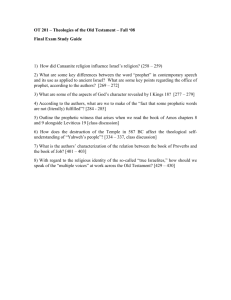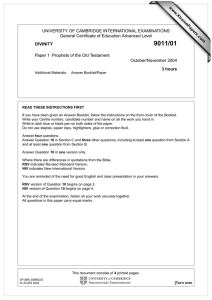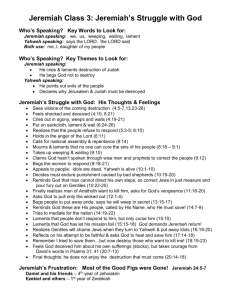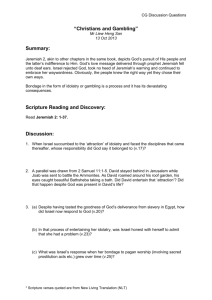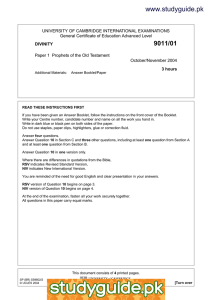9011 DIVINITY MARK SCHEME for the October/November 2011 question paper
advertisement
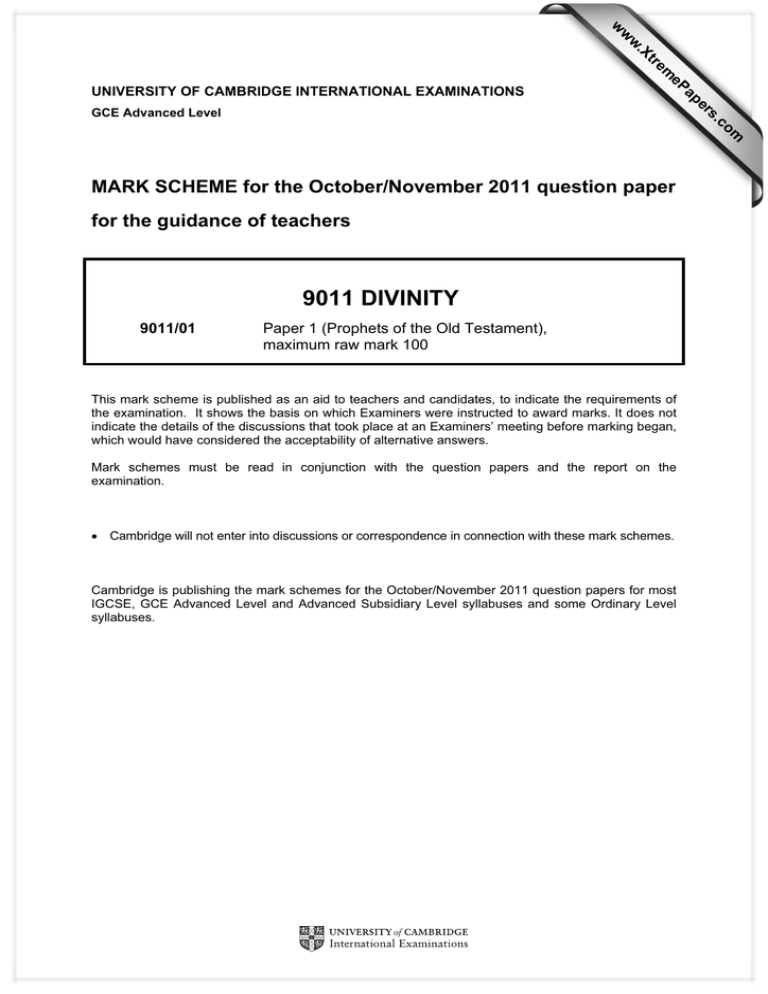
w w ap eP m e tr .X w UNIVERSITY OF CAMBRIDGE INTERNATIONAL EXAMINATIONS s er om .c GCE Advanced Level MARK SCHEME for the October/November 2011 question paper for the guidance of teachers 9011 DIVINITY 9011/01 Paper 1 (Prophets of the Old Testament), maximum raw mark 100 This mark scheme is published as an aid to teachers and candidates, to indicate the requirements of the examination. It shows the basis on which Examiners were instructed to award marks. It does not indicate the details of the discussions that took place at an Examiners’ meeting before marking began, which would have considered the acceptability of alternative answers. Mark schemes must be read in conjunction with the question papers and the report on the examination. • Cambridge will not enter into discussions or correspondence in connection with these mark schemes. Cambridge is publishing the mark schemes for the October/November 2011 question papers for most IGCSE, GCE Advanced Level and Advanced Subsidiary Level syllabuses and some Ordinary Level syllabuses. Page 2 Mark Scheme: Teachers’ version GCE A LEVEL – October/November 2011 Syllabus 9011 Paper 01 Section A Prophecy in general and Pre-canonical Prophets 1 Examine the origins of prophecy in Israel. In general terms, a good case can be made for the origins of prophecy in other civilisations that influenced ancient Israel: • ecstasy, e.g. with Wen Amon • the mantic/muhhum prophets of the god Dagan, during the time of Hammurabi • the Syrian weather-god Hadad, in the Mari texts, using a prophet as his mouthpiece • the general Canaanite background to the OT suggests an immediate influence from Baal prophets. Some scholars maintain an Israelite origin for prophecy in Israel: • e.g. based on the assumption that Israelite prophecy is unique • and that Israel was supposedly forbidden to use the means of gaining information used by other nations (Deut.18) • prophecy allowed only in the name of Yahweh • the association with ethical monotheism • the view that prophecy began in Israel with Moses, or Samuel, for example, the latter in association with the adoption of kings in Israel. © University of Cambridge International Examinations 2011 Page 3 2 Mark Scheme: Teachers’ version GCE A LEVEL – October/November 2011 Syllabus 9011 Paper 01 Consider who had the greater influence on the development of Old Testament prophecy – Samuel or Elijah. Samuel lived in a time of radical change, and was at the centre of it. • credit historical details from amphictyony to monarchy • circumstances of birth & call suggest a special prophetic mission • development of the role of seer/nabi: 1 Sam.9 – relationship to prophetic bands, etc • Samuel as war leader / historical details about the Philistines • Samuel as adviser to Saul, and rejecting Saul’s disobedience: developmental role in instigation of court prophecy • role as judge and priest show a wide-ranging role. Candidates might suggest that this makes Samuel more or less of a prophet • if Samuel’s multi-roles are a read-back from later editors, this itself might underline Samuel’s importance in the history of the prophetic tradition • alternatively, if Samuel is a literary construct, this would undermine his developmental influence on prophecy. Elijah had archetypal importance, e.g. at Sinai in connection with election, covenant, salvation, law, revelation of God, etc. • reviving contact with God and vision • importance of the theophany, restoring proportion • sense of failure and isolation surfaces in later prophets, although some might argue that this is seen in Moses also • wonder-working ability • nature of his translation to heaven • transfer of his prophetic authority • messianic associations in later Judaism • relationships with the authorities of his day, i.e. in setting up the pattern of prophetic confrontation with / criticism of kings. Most responses will discuss the importance of Samuel & Elijah rather than their developmental roles in prophecy. Accept this but give proper credit to those who write less but stick to the form of the question. Some kind of comparative aspect needs to be present for access to the higher grades. 3 Discuss the importance of ecstasy in Old Testament prophecy. Candidates are likely to answer this question by giving examples of ecstatic behaviour. Accept examples from pre-exilic as well as pre-canonical prophets. The importance of ecstasy will then be illustrated through its role in the narrative being described – e.g. the negative attitude to the ecstatic frenzy of the Baal prophets contesting with Elijah on Mount Carmel; Saul’s ecstatic fervour with the sons of the prophets (suggesting its contagious nature); the similar example from the Moses narratives with the transfer of Moses’ power to the elders; Elijah’s augmented power in running before Ahab’s chariot, and so on. Some candidates may be aware that it is assumed that all prophets functioned ecstatically, depending on how the phenomena are interpreted. The prophetic word and vision were presumed to operate by the prophet’s ecstatic state giving him/her access to Yahweh’s heavenly council in which the word/dabar was generated. Some may equate ecstatic prophecy with false prophecy. © University of Cambridge International Examinations 2011 Page 4 4 Mark Scheme: Teachers’ version GCE A LEVEL – October/November 2011 Syllabus 9011 Paper 01 ‘Oracles of doom were the most important way of conveying the prophet’s message.’ Discuss. Candidates should be able to show the general structure of the doom oracle. Again, accept examples from throughout the prophetic period. The doom oracle has the general structure of: Thus says Yahweh / reason for the complaint / sometimes a contrast with Yahweh’s previous acts on behalf of (Israel) contrasted with current behaviour / pronouncement of doom/destruction / concluding formula: Oracle of Yahweh. This structure is widespread, and suggests that it is the typical formula used to convey the prophetic word to its recipients. It is far more prevalent than the form of the salvation oracle, and Jeremiah presumes that all prophecy up to his own era was based on announcements of doom, since promises of salvation are typically false. Candidates should be able to show that the prophets used several techniques in order to convey their message: e.g. speeches, poems, symbolic acts, miracles, etc., and they should be able to show the importance of those they refer to. The question expects some form of comparative judgement to answer the “most important” element in the question. Some might conclude that all methods were important in conveying the prophet’s message, since the method was selected in order to fit the message, and could combine different techniques. 5 Consider the view that the pre-canonical prophets were always involved with war and violence. Candidates are likely to answer this question in the affirmative by giving a historical résumé from Moses onwards, detailing the prophets’ involvement in war and violence. Much of this will probably concentrate on Moses and the plagues, Elijah on Mount Carmel, and Samuel and the Philistines. Some might be more subtle and include material such as Nathan’s comments on David’s disposal of Uriah the Hittite, the Micaiah ben Imlah narrative, Elijah and the name-calling youths, and so on. If candidates talk about mental violence, for example, accept alternative understandings such as that. For alternative viewpoints, candidates might refer to examples of prophetic activity that were lifegiving / beneficial, etc., e.g. Moses feeding the escaping Hebrews in the desert; Nathan’s involvement with the building of the Temple; Elijah and the widow, and so on. It would also be appropriate for candidates to make general comments about the inevitability of the prophets being involved in war and violence, since their calling was unavoidably linked to the political situation at the time, and the history of the Ancient Near East is the history of war and violence. This does not mean that they were necessarily warlike or violent personally. © University of Cambridge International Examinations 2011 Page 5 Mark Scheme: Teachers’ version GCE A LEVEL – October/November 2011 Syllabus 9011 Paper 01 Section B Pre-exilic Prophets, with special reference to Amos, Hosea, Isaiah of Jerusalem and Jeremiah 6 Using Hosea 1-3, examine different ways in which the prophet’s personal experience might be interpreted. There are many lines that candidates might take here. Since the question refers to ‘ways’, at least two different interpretations are expected for access to the higher grades. Candidates should be able to show, for example that Hosea 1-3 can be interpreted either as an allegorical story representing Israel’s relationship with God, in which the prophet either applies his real marital experiences to that of the nation and God, or else invents it / uses it as a metaphor for the purposes of illustration. A further possibility would be that the detail of the marriage is the work of a later editor, or else that it combines elements of both fact and fiction. Another level of interpretation is added by the identity of the woman in 3:1 – “The Lord said to me again, ‘Go, love a woman …’ “. This may still be Gomer, or else a second woman intended to reinforce the pathos of the situation. Most candidates will develop the view that Gomer’s relationship with Hosea refers to Israel’s relationship with Yahweh, Gomer’s adultery expressing Israel’s abrogation of the covenant. Hosea’s rejection by Gomer represents Yahweh’s rejection by Israel. Hosea’s continuing love for Gomer represents Yahweh’s continuing hesed/love for Israel, the love in both cases being unrequited, or sometimes forgotten. This interpretation then develops the concept of Yahweh’s punishment as being remedial and not irretrievable: Yahweh is God, not man. Candidates might go on to discuss the suggestion that the marriage material forms part of Hosea’s call (possibly in the context that both he and Gomer functioned within the cult) and, as such, may have been formative in his attitude and message, showing the balance of love against judgement. Balance of material is not important, the only requirement being for candidates to have some awareness of the different interpretations of the material. 7 ‘Amos prophesied that Israel could not escape total destruction, so there was no point to his prophecy.’ Critically examine this claim. There are a number of lines of argument that candidates could take with this question. Most are likely to illustrate the unavoidable nature of destruction, giving an extended demonstration of the doom oracles, linked to Amos’ critique of the social ills that compelled him to prophesy. Emphasis will probably be given to elements such as: • the repetition that Yahweh “will not revoke the punishment” (chapters 1-2) • the point that Israel is the recipient of Yahweh’s election promises makes punishment even more certain, since election requires greater responsibility (3:2) • Amos’ visions of destruction: 3:12; 7:4-6, 7-9; 8:1-3, 9-14; 9:1-10 • the lament over fallen Israel: 5:2-3, 16-17 • the ‘Day of the Lord’ that will be darkness, not light: 5:18-20 • the self-indulgent rich will be the first into exile: 6:1-7; punishment will be thorough: 6:8-14 • Amos’ promise of exile given through Amaziah: 7:10-17. Some are likely to balance this material by contrasting it with some of the intercessory material where Yahweh changes his mind (7:2-3, 4-6); also with the prophecy of restoration in 9:11-15. This material could be interpreted to mean that destruction would not be total, or else the reverse, if the material is from a later editor. © University of Cambridge International Examinations 2011 Page 6 Mark Scheme: Teachers’ version GCE A LEVEL – October/November 2011 Syllabus 9011 Paper 01 To say that there was no point to Amos’ prophecy might be argued if destruction was to be total, since Amos’ words would amount to nothing more than a very severe telling-off. If there was nothing that Israel could do to avoid destruction, then what was the point of Amos’ message other than to rub salt into the inevitable wounds? Some might argue that Amos did believe that some might escape: thus in 5:6 he says, “Seek the Lord and live” – the injunction would be pointless if there was no possibility that anyone would do so. This question is a departure from the usual run of Amos questions, so credit all attempts at reasoning. 8 In your view, which was the bigger influence on the prophecy of Isaiah of Jerusalem – his call, or the historical situation of his day? Important elements in the call story might include: • timing: an effective Davidic king had died, leaving no adequate heir – a void which God himself fills • the theophany in the Temple: Isaiah had an experience of the real presence of Yahweh, persuading him of the holiness of the Temple, and, by extension, of Jerusalem • this reinforces the then-current Jerusalem theology linked to the Davidic dynasty / its application by Isaiah • the theophany brings a conviction of the holiness, power and universal sovereignty of Yahweh, as well as a knowledge of his ultimate kingship over Israel: how this was used in Isaiah’s message, and in relation to the Davidic king • the call itself giving Isaiah authority and confidence • the suggestion in the call that the message will not be accepted, so the nation is moving towards disaster: helps Isaiah to accept rejection and to look beyond, to the messianic age. A common treatment will probably be to discuss the effect of the call on Isaiah’s treatment of the historical situation. Since most of the above themes arguably have historical application in terms of Isaiah’s involvement in the Assyrian crisis, his comments on Egyptian alliances, and so on, candidates are likely to arrive at the conclusion that his call was more important. Accept any reasoning offered by candidates as credit-worthy, whatever conclusion is reached. 9 ‘Jeremiah could be described as a prophet of hope.’ How far do you agree with this view? There are undeniably hopeful elements in Jeremiah’s prophecies, although the Book of Jeremiah has undergone such an involved process of editing that it is difficult to know which elements are due to editorial comment as opposed to Jeremiah’s own ideas. Candidates are likely to refer to: • the parable of the good and bad figs • his positive comments in his letter to the exiles • the hopeful gesture of buying a field • the hope expressed in the concept of the New Covenant. Candidates are likely also to refer to the bulk of material signifying doom, especially Jeremiah’s own comment that no genuine prophet before him had prophesied salvation, which appears to show that salvific elements in the book are secondary additions. Reference is likely to be made also to: • the parables/actions of the waistcloth, potter, wooden yoke, etc. • the confessional material, which is generally seen as typical of Jeremiah’s doom & gloom attitude, although some scholars see this material as having a cultic context • Jeremiah’s personal life – no obvious access to friends or family • his denunciation of the cult, especially in the Temple Sermon © University of Cambridge International Examinations 2011 Page 7 • • Mark Scheme: Teachers’ version GCE A LEVEL – October/November 2011 Syllabus 9011 Paper 01 the strength of his denunciation of false prophets / the death of Hananiah / predictions of disaster to Zedekiah, Passhur, et al. his actions during the siege – being restrained by the authorities because he was seen to be advocating pro-Babylonian policies. Some might suggest that describing Jeremiah as a prophet of hope or as a prophet of doom is inappropriate, and that the content of the message was dictated by the situation and by Yahweh, and was not of Jeremiah’s choosing. Some might point to Jeremiah’s call narrative, where Yahweh commissions him to “pluck up and to break down …. To build and to plant”, which might suggest that Jeremiah’s prophecy would naturally contain elements of both hope and doom. On that reading, again, it would not be appropriate to describe Jeremiah as a prophet of hope or of doom: he used both styles when appropriate. 10 Comment on points of interest or difficulty in four of the following passages (wherever possible answers should refer to the context of the passage but should not retell the story from which the passage is taken): (a) I am not able to carry all this people alone, the burden is too heavy for me. If thou wilt deal thus with me, kill me at once, if I find favour in thy sight, that I may not see my wretchedness. (Numbers 11:14-15) General context is the choosing of 70 elders to lighten Moses’ burden of leadership. Candidates will comment on some of the following: • the immediate context is God’s ‘hot anger’ at the murmuring of the people in the wilderness. Not satisfied with manna, they wanted the kind of food they had eaten in Egypt • Moses appears as ‘displeased’ and impatient (cf. Exodus 17:2-4) • on the burden, some might mention Jethro’s advice in Exodus 18:17-18 • the distribution of the spirit, the sign of which was that they prophesied, once only • ecstatic utterance (probably with comments about Canaanite influence) • the perception that the story is anachronistic, perhaps as a vindication of ecstatic prophecy put into Moses’ mouth in the face of later criticisms of Israelite ecstatics • this episode is followed by Eldad and Medad prophesying, although they stayed in the camp. Some might comment on prophetic contagion • Yahweh descending in the cloud • this account involves the old ‘tent of meeting’. (b) Then the LORD said to Samuel, “Behold, I am about to do a thing in Israel, at which the two ears of every one that hears it will tingle. On that day I will fulfil against Eli all that I have spoken concerning his house, from beginning to end.” (1 Samuel 3:11-12) General context is God’s first revelation to Samuel. Candidates will comment on some of the following: • Samuel was 12 years old at this time, according to Jewish tradition. There are echoes of this narrative in the introduction to Luke’s Gospel • narrative begins with a comment on the rarity of (prophetic) revelation • Eli’s advice to Samuel concerning the call • Samuel’s obedience, followed by the extract here • message of unending punishment to Eli’s house for not restraining his sons, who had been blasphemous © University of Cambridge International Examinations 2011 Page 8 • • • • Mark Scheme: Teachers’ version GCE A LEVEL – October/November 2011 Syllabus 9011 Paper 01 the threat relates to an earlier threat (2:27ff) which spells out the punishment, and which justifies the exclusion of Abiathar and his family from the priesthood in favour of the Zadokite priestly line. It typifies the Deuteronomic theme of the sins of the fathers (Eli & his sons) being visited on the children (Eli was an ancestor of Abiathar) this kind of threat becomes typical in prophetic narratives – guilt followed by punishment like cause and effect Samuel’s fear to tell Eli about the vision. Eli typifies the Eastern attitude of being under God’s command by commanding Samuel to speak about the vision, and by accepting the judgement as the Lord ‘doing what seems good to him’ (v.18) thereafter, Samuel becomes established as a Yahweh-prophet, leading up to his involvement in the war with the Philistines. (c) (Formerly in Israel, when a man went to inquire of God, he said, “Come, let us go to the seer”; for he who is now called a prophet was formerly called a seer.) And Saul said to his servant, “Well said; come, let us go.” So they went to the city where the man of God was. (1 Samuel 9:9-10) General context is the narrative of the secret choice of Saul as king (9:1-10:16). Candidates will comment on some of the following: • most commentators see this as an editorial comment on the language used to describe prophets / prophecy in the editor’s own time. Comment is still guesswork, because the details are not clear • seers: Hebrew hozeh / roeh – someone with access to hidden information, usually consulted by someone who paid for the privilege • Gad as David’s seer looks into the future and proclaims the will of Yahweh • narrative of Amos at Bethel (Amos 7:12ff), where Amos can still be called a seer, and where Amos appears to accept the equivalence of seer/hozeh and the nabi / bene hanebiim (prophet / sons of the prophets) • prophet: Hebrew nabi. Accept explanation in any detail – e.g. they were God’s messengers, used the messenger formulae (‘Thus says Yahweh’ / ‘Oracle of Yahweh’) / early prophets moved about in groups, as in this narrative / they appear to have been ecstatics • I Samuel 9:9 does not seem simply to talk about a change in the use of language so much as a fact of historical use, implying that in earlier times in Israel there had been a professional class of seers in the strict sense, and that these no longer existed, since their functions had been subsumed under those of the nebiim • accept details from the narrative: Saul’s appearance; the lost asses; Saul’s servant’s suggestion about the Man of God; the meeting with Samuel on the road to the sanctuary; Samuel’s foreknowledge of the meeting; Saul eats with Samuel; Saul elected as king. (d) But Naboth said to Ahab, “The LORD forbid that I should give you the inheritance of my fathers.” And Ahab went into his house vexed and sullen because of what Naboth the Jezreelite had said to him; for he had said, “I will not give you the inheritance of my fathers.” And he lay down on his bed, and turned away his face, and would eat no food. (1 Kings 21:3-4) General context is the narrative of Ahab’s acquisition of Naboth’s vineyard. Candidates will comment on some of the following: • proximity of the vineyard to the palace, so Ahab wanted it as a vegetable garden • nature of inheritance tradition, where, by legal and religious custom, ancestral property had to remain in the family for perpetuity (Leviticus 25:10,13-17,23-24,34). © University of Cambridge International Examinations 2011 Page 9 • • • • • • • Mark Scheme: Teachers’ version GCE A LEVEL – October/November 2011 Syllabus 9011 Paper 01 Jezebel had no respect for law or custom in Israel, so proposed to flout it Ahab’s childish behaviour when he did not get what he wanted Jezebel’s rhetorical & contemptuous attempt to stiffen Ahab’s resolve Jezebel acts as Ahab, writing letters in his name, and signing them with his seal proclaiming a fast was part of the business of an assembly convened to consider serious problems (Judges 20:26; 1 Samuel 7:6; 14:24) other details – setting Naboth on high, probably meaning he was to preside, as a prominent citizen; for ‘two witnesses’ and death by stoning, see Deuteronomy 17:5-6; 19:15; cursing God and the king – Exodus 22:28; Leviticus 24:10-16 Elijah’s intervention. (e) “Also I brought you up out of the land of Egypt, and led you forty years in the wilderness, to possess the land of the Amorite. And I raised up some of your sons for prophets, and some of your young men for Nazirites. Is it not indeed so, O people of Israel?” says the LORD. (Amos 2:10-11) General context is (in 1:1-2:16) the indictment against other nations. Candidates will comment on some of the following: • same standards are to apply to Israel as to her neighbours. Judgement is not reserved for other nations, but will be applied to Israel as a proper punishment for social injustices and religious sins • candidates might be able to specify that oracles against the foreign nations include, in this section, Syria, Philistia, Tyre, Edom, Moab, Ammon and Judah • reference perhaps to the king of Moab committing an unpardonable offence by burning to lime the bones of the king of Edom • in the immediate context, God refers to his help given to Israel during the Exodus and the wilderness wanderings at the expense of the Amorites. Such favourable treatment will no longer continue • comment on the raising up of the prophets and the Nazirites is explained in the following verse, and should be understood by candidates as part of the prophet’s invective against Israel’s social misconduct in (1) inciting the Nazirites to drink wine, despite the fact that this broke their vows, and (2) muffling the voice of prophecy in the land, which was tantamount to muting the word of God himself. (f) Then Amos answered Amaziah, “I am no prophet, nor a prophet's son; but I am a herdsman, and a dresser of sycamore trees, and the LORD took me from following the flock, and the LORD said to me, ‘Go, prophesy to my people Israel.’ ” (Amos 7:14-15) General context is the conversation between Amos and Amaziah. Candidates will comment on some of the following: • Amaziah official priest of the royal sanctuary at Bethel • incident recorded here perhaps because of the threat against the house of Jeroboam in v.9, and Amaziah warns him that Bethel is the king’s sanctuary (where threats against the royal shrine or house are not acceptable, especially from a southern prophet) • Amaziah’s instruction to Amos to go back to Judah and earn his keep (“eat bread”) there, which implies that Amos is a professional prophet • Amos asserts that he is not a nabi nor one of the bene hanebiim (credit reference to the terminology and explanations of it) – by which he appears to mean that he is not a professional prophet or a member of a prophetic guild, but was taken by Yahweh as a layman – a herdsman / dresser of sycamore trees © University of Cambridge International Examinations 2011 Page 10 • • • Mark Scheme: Teachers’ version GCE A LEVEL – October/November 2011 Syllabus 9011 Paper 01 alternatively, the Hebrew can be translated in the past tense – I was no nabi, etc., but was a shepherd, etc. – which implies that Amos does now consider himself to be a professional prophet some argue that Amos was a functionary attached to Bethel, and that Amaziah told him to escape to Judah, since his life was forfeit for making threats against Jeroboam and his sanctuary credit reference to prophetic compulsion. (g) Come, let us return to the LORD; for he has torn, that he may heal us; he has stricken, and he will bind us up. After two days he will revive us; on the third day he will raise us up, that we may live before him. Let us know, let us press on to know the LORD; his going forth is sure as the dawn; he will come to us as the showers, as the spring rains that water the earth. (Hosea 6:1-3) General context is Israel’s sickness and Hosea’s exhortation to repentance. Candidates will comment on some of the following: • background is the period of the Syro-Ephraimite war (735-733) and its aftermath • 5:8-15 describes the friction between Judah and Israel in the period after the war, and shows God’s judgement on both • the immediate context is that having threatened sickness and death, Yahweh predicts that Israel will “revive” if Yahweh’s exhortation to repent is accepted and acted upon • questions about the identity of the speaker(s) – possibly the Israelites, but they are insincere, or (more likely) these are Hosea’s words, as an exhortation to the people • another question is whether the imagery is of resurrection from death or simply healing the sick. Death & resurrection are also images of exile and restoration, and perhaps Hosea appropriated this imagery from the dying and rising God Baal (see 13:1 – “he incurred guilt through Baal and died”) • some see the language as applicable to the future situation of Jesus • comment on the rest of the imagery – the revival that comes from spring rain. (h) When Israel was a child, I loved him, and out of Egypt I called my son. The more I called them, the more they went from me; they kept sacrificing to the Baals, and burning incense to idols. Yet it was I who taught Ephraim to walk … (Hosea 11:1-3a) General context is the portrait of Yahweh as a loving / patient father who now has to punish his disobedient son. Candidates will comment on some of the following: • the oracle changes Hosea’s imagery from that of the husband and wife to that of the father and son • oracle begins by reflecting Exodus 4:22, where God instructs Moses to demand from Pharaoh the release of Israel, his first-born son • reference to Matthew 2:15 would be appropriate here • discipline is part of the love of a father • comment on castigation of Baal worship elsewhere in the book • explanation of ‘Ephraim’ • rest of the oracle includes Hosea’s prophecy of destruction by Assyria, mitigated in 8ff by the contrasting picture of God as the Holy One in their midst whose “compassion grows warm and tender”, which invites reference to Hosea’s treatment of Gomer. © University of Cambridge International Examinations 2011 Page 11 Mark Scheme: Teachers’ version GCE A LEVEL – October/November 2011 Syllabus 9011 Paper 01 (i) In that day the LORD will whistle for the fly which is at the sources of the streams of Egypt, and for the bee which is in the land of Assyria. And they will all come and settle in the steep ravines, and in the clefts of the rocks, and on all the thornbushes, and on all the pastures. In that day the Lord will shave with a razor which is hired beyond the River – with the king of Assyria – the head and the hair of the feet, and it will sweep away the beard also. (Isaiah 7:18-20) General context is a four-part punishment outlined for Judah in 7:18-25, dealing with the oppression coming from the neighbouring states of Egypt and Assyria. Candidates will comment on some of the following: • flies from Egypt and bees from Assyria are common pests that will occupy a whole country, so that Judah will be completely overrun • Assyria is then to be hired as a razor, so that its army of mercenaries will use swords to shave the people’s hair • “feet” is a euphemism for the genitals, so the image is particularly venomous • to shave the beard was seen as an insult and a humiliation, so Judah’s ignominy is to be very severe (cf. 2 Samuel 10:4) • comment on the following verses: they describe Yahweh’s accompanying ‘mercy’, in that there will be survivors, eking out a living with at most one cow and two sheep. They will have ample food, but only because of the small size of the remaining population who will eat curds and milk (a reminder of the wilderness fare). There will not even be enough people to look after a well-kept vineyard, which will become a home for thistles and thorns • credit attempts to locate the historical background in the Syro-Ephraimite war and the Assyrian attack on Jerusalem. (j) Righteous art thou, O LORD, when I complain to thee; yet I would plead my case before thee. Why does the way of the wicked prosper? Why do all who are treacherous thrive? Thou plantest them, and they take root; they grow and bring forth fruit; thou art near in their mouth and far from their heart. But thou, O LORD, knowest me; thou seest me, and triest my mind toward thee. Pull them out like sheep for the slaughter, and set them apart for the day of slaughter. (Jeremiah 12:1-3) General context is Jeremiah’s first personal lament: 11:18-12:6. Candidates will comment on some of the following: • lament suggests a plot against Jeremiah’s life (11:18,19; 12:6; 11:20; 12:3b are often transposed in that order to reconstruct the complaint) • first of 6 laments / complaints / confessions • complaint put into the form of a rib – a ‘covenant lawsuit’ brought by the prophet against Yahweh • some suggest a cultic background – that Jeremiah is acting as a cultic prophet, and is voicing the complaint of an individual who has paid for his professional services in this respect: the worshipper expects a reply from God through the medium of the prophet. The reply is perhaps seen in 12:5-6 • on the other hand, the language seems more personal than professional • the complaint in the immediate context is the widespread one concerning evil. Theology at the time assumed that the wicked always suffer and the righteous always prosper, but common experience suggests that this is false: the wicked, who present a righteous face (‘near in the mouth, far from the heart’), always prosper (compare Job 21) • imagery of thriving plant • Jeremiah asserts his own integrity (again, like Job. See also Psalm 139:23-24) © University of Cambridge International Examinations 2011 Page 12 • • Mark Scheme: Teachers’ version GCE A LEVEL – October/November 2011 Syllabus 9011 Paper 01 Jeremiah’s request that the wicked should be pulled out and set apart like sheep for the slaughter reflects the beginning of his complaint, in 11:19, where he pictures himself as “a gentle lamb led to the slaughter” – the proverbial description of innocence Yahweh’s reply is formulated in two proverbial sayings (12:5): the present situation is a preparation for something far worse in the future: ‘If you fall down in a safe land, how will you fare in the jungle of the Jordan’? – the latter being a reference to the thickets of the gorge of the Jordan (49:19) that are the abode of dangerous wild animals. (k) Therefore thus says the LORD: “If you return, I will restore you, and you shall stand before me. If you utter what is precious, and not what is worthless, you shall be as my mouth. They shall turn to you, but you shall not turn to them. And I will make you to this people a fortified wall of bronze; they will fight against you, but they shall not prevail over you, for I am with you to save you and deliver you,” says the LORD. (Jeremiah 15:19-20) General context is Jeremiah’s second lament (15:10-21). • • • • • • • Candidates will comment on some of the following: credit detail on lament / confessional material (credit only once if candidate does both Jeremiah gobbets) does not appear to show Jeremiah acting as a cultic prophet: language is too personal (“Woe is me, my mother, that you bore me, a man of strife and contention to the whole land” does not sound like the structured lament of a professional) detail of this lament: Jeremiah’s innocence; request for vengeance on his persecutors; God’s words as a joy in his heart; Jeremiah’s isolation; the unceasing pain / incurable wound of rejection; accusation: “Wilt thou be to me like a deceitful brook, like waters that fail?” – i.e. the drying-up of Yahweh’s approval and care immediate context is Yahweh’s reply: God applies Jeremiah’s own message to himself; there is no promise of respite from isolation and opposition, but there is a promise of constant support verse 19 uses a technical phrase often used of restoration from exile: “return … restore” – implying that Jeremiah’s language, addressed to God, is based on ignorance. God says much the same thing to Job, who in fact repents of his intemperate complaints to God, and who therefore receives a double restoration (Job 42) Jeremiah is told to utter what is precious, not what is worthless, then he will once more be God’s prophet (“mouth”) who will be protected by God. Jeremiah’s treatment by his opponents is an inevitable aspect of his vocation repetition of assurances of protection: “save … deliver … deliver … redeem”. © University of Cambridge International Examinations 2011
